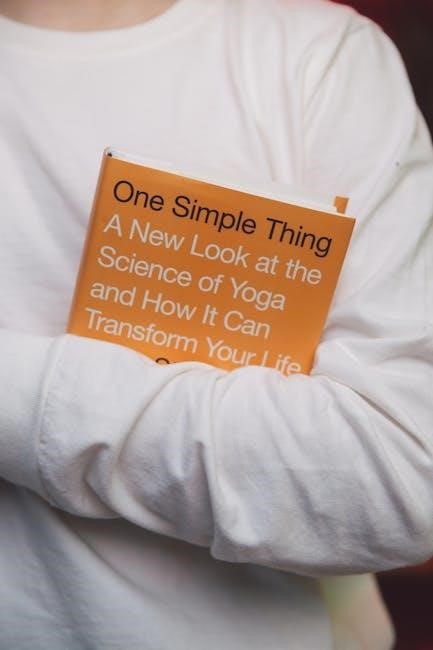
Free therapy e-books and resources empower individuals and professionals with accessible tools for mental health growth and education, fostering self-help and therapeutic development.
1.1 Overview of the Importance of Accessible Therapy Materials
Accessible therapy materials, such as free e-books and downloadable resources, play a crucial role in democratizing mental health education. They provide affordable tools for self-help, professional training, and therapeutic interventions. These resources bridge gaps in access, enabling individuals to explore evidence-based techniques like CBT and DBT without financial barriers. Professionals also benefit, as these materials offer practical exercises and workbooks for clinical practice. By making therapy resources widely available, they promote mental health awareness and support personal and professional growth globally.
1.2 Benefits of Using Free PDF Downloads for Therapy Education
Free PDF downloads offer numerous benefits for therapy education, including cost savings, easy access, and convenience. These resources provide high-quality, evidence-based materials for self-study and professional development. They cater to diverse learning needs, offering practical tools like worksheets and exercises. Users can access these materials anytime, facilitating continuous learning. Additionally, free PDFs allow professionals to explore various therapeutic approaches, enhancing their expertise and patient care. Overall, they serve as invaluable resources for both personal growth and professional advancement in mental health fields.

Reputable Sources for Free Therapy E-Books
Reputable sources like SAMHSA, NIDA, and 12-step organizations offer high-quality, free therapy e-books, ensuring accessible and evidence-based resources for mental health education and professional development.

2.1 SAMHSA Workbooks and Publications
SAMHSA offers a wide range of free workbooks and publications that address mental health, substance abuse, and recovery. These resources are designed to provide evidence-based strategies and tools for professionals and individuals seeking self-help. Topics include trauma, coping skills, and relapse prevention, all presented in an accessible format. SAMHSA materials are widely recognized for their quality and relevance, making them a trusted source for mental health education and support. They can be downloaded directly from SAMHSA’s official website, ensuring easy access to valuable information.
2.2 National Institute on Drug Abuse (NIDA) and Alcohol Abuse (NIAAA) Resources
The National Institute on Drug Abuse (NIDA) and the National Institute on Alcohol Abuse and Alcoholism (NIAAA) provide free, evidence-based resources for therapy education. These include workbooks, fact sheets, and guides on addiction science, treatment, and recovery. NIDA’s materials focus on drug abuse prevention and treatment, while NIAAA offers resources on alcohol-related disorders. Both institutes ensure their publications are accessible to professionals and individuals seeking self-help. Visit their official websites to explore and download these valuable therapy education materials for free.
2.3 12-Step Literature and Workbooks
12-Step literature and workbooks are widely available for free, offering structured guidance for recovery and personal growth. Many 12-Step organizations provide downloadable PDFs of their core texts, meeting guides, and workbooks. These resources often include step-by-step instructions, personal stories, and practical exercises. They are particularly useful for individuals in recovery and professionals supporting them. The materials emphasize community support, self-reflection, and actionable steps, making them invaluable for both individual and group therapy settings. Access these resources directly through official 12-Step program websites.

Popular Therapy E-Books Available for Free Download
Discover a wide range of free therapy e-books offering evidence-based techniques and practical exercises for mental health improvement and professional development.
3.1 Cognitive Behavioral Therapy (CBT) Workbooks
Cognitive Behavioral Therapy (CBT) workbooks are widely available as free PDF downloads, offering practical exercises and evidence-based techniques for managing mental health issues. These resources are designed to help individuals identify and change negative thought patterns, fostering emotional resilience and behavioral change. Many workbooks, such as those by Judith Beck, provide clear, jargon-free guidance, making them accessible to both self-help learners and professionals. Key features include structured lessons, worksheets, and real-life examples, ensuring a comprehensive approach to applying CBT principles effectively.
- Practical exercises for self-help and professional use
- Evidence-based techniques for mental health improvement
- Suitable for both individuals and therapy practices
3.2 Dialectical Behavior Therapy (DBT) Skills Manuals
Dialectical Behavior Therapy (DBT) skills manuals are valuable free resources offering practical techniques for emotional regulation and distress tolerance. These manuals often include exercises on mindfulness, interpersonal effectiveness, and emotional acceptance. Websites like ilovedbt.wordpress.com provide micro-lessons and handouts, while platforms like Mind Body Soul Therapy offer introductory courses. These materials are designed to help individuals manage intense emotions and improve relationships, making them essential tools for both self-help and therapeutic settings.
- Focus on emotional regulation and distress tolerance
- Includes mindfulness and interpersonal skills
- Available through various online platforms
3.3 Mindfulness and Acceptance and Commitment Therapy (ACT) Resources
Mindfulness and ACT resources offer practical tools for reducing stress and enhancing psychological flexibility. Free PDF downloads often include guided meditations, diary cards, and exercises to cultivate acceptance and values-based action. Websites like Now Matters Now provide interactive tools, while platforms offering free ACT workbooks focus on mindfulness techniques and emotional regulation. These resources are ideal for self-help and therapeutic settings, promoting mental well-being through evidence-based practices.
- Focus on mindfulness and emotional acceptance
- Incorporate guided meditations and diary cards
- Available through reputable online platforms
- Play therapy exercises for emotional expression
- Movement therapy for stress relief
- Therapeutic board games for social skills
- Play therapy exercises for emotional expression
- Role-playing to practice social interactions
- Creative activities for stress relief
- Guided yoga and stretching routines
- Mindfulness-based movement exercises
- Relaxation techniques for stress reduction
- Board games for social skills development
- Creative art therapy exercises
- Interactive storytelling templates

Therapeutic Techniques and Activities in Free Downloads
Free therapy downloads often include play therapy, role-playing, and movement exercises, along with relaxation techniques and therapeutic board games, promoting creativity and engagement in mental health care.
4.1 Play Therapy and Role-Playing Exercises
Free therapy e-books often include play therapy and role-playing exercises, designed to help individuals, especially children, express emotions and develop coping skills. These activities foster creativity and emotional exploration, enabling users to process challenges in a safe environment. Techniques like drawing, storytelling, and pretend play are commonly featured, alongside structured role-playing scenarios to enhance social and interpersonal skills. Many resources also provide guidance for professionals to adapt these exercises for diverse needs and settings, ensuring effective and engaging therapeutic experiences.
4.2 Movement Therapy and Relaxation Techniques
Free therapy e-books often incorporate movement therapy and relaxation techniques, offering practical tools for stress reduction and emotional well-being. These resources include guided exercises like yoga, breathing practices, and progressive muscle relaxation to help individuals manage anxiety and improve focus. Many PDF downloads provide step-by-step instructions for mindful movement, making it accessible for users to practice at home or in therapeutic settings. These techniques are particularly effective for promoting physical and mental relaxation, enhancing overall therapeutic outcomes.

4.3 Therapeutic Board Games and Creative Activities
Free therapy e-books often include therapeutic board games and creative activities designed to enhance communication, emotional expression, and social skills. These resources offer engaging tools for both children and adults, promoting teamwork and self-reflection. Activities like art projects, storytelling, and role-playing exercises are commonly featured. Many downloads provide adaptable worksheets and game templates, making them suitable for various therapeutic settings. These creative approaches foster a dynamic and interactive environment, encouraging personal growth and emotional healing in a fun and accessible way.

Professional and Ethical Considerations
Free therapy resources must be used ethically, ensuring proper application by qualified professionals. Materials are designed for therapeutic purposes, requiring adherence to guidelines for safe and effective use.
5.1 Importance of Qualified Mental Health Professionals
Qualified mental health professionals are essential for effectively utilizing free therapy resources. Their expertise ensures materials are applied safely and appropriately, adapting techniques to individual needs. While free e-books provide valuable tools, they should not replace professional guidance. Therapists bring clinical judgment and experience, crucial for navigating complex mental health issues. Proper training and licensure are vital to ethically implement therapeutic strategies, ensuring interventions are evidence-based and tailored to specific circumstances. This expertise safeguards both clients and the integrity of the therapeutic process.
5.2 Ethical Usage of Free Therapy Materials
Ethical usage of free therapy materials requires adherence to copyright laws and respect for intellectual property. Users must ensure materials are downloaded legally and used responsibly. Proper attribution to authors and sources is essential. Confidentiality and client privacy should always be maintained when applying these resources. Additionally, materials should not be altered or distributed without permission. Ethical considerations also include avoiding misuse for commercial gain and ensuring that the content aligns with professional standards and evidence-based practices.

Steps to Download and Utilize Therapy E-Books
Locate reputable sources, download free therapy e-books, and apply the materials in practice to enhance mental health support and self-help initiatives effectively.
6.1 Finding Reliable Websites for Downloads
Reputable websites like SAMHSA, NIDA, and NIAAA offer free therapy e-books and resources. Ensure websites are government-affiliated or run by trusted mental health organizations. Look for secure connections (HTTPS) and clear download options. Avoid sites with excessive ads or suspicious links. Check for peer-reviewed or expert-endorsed materials to ensure quality; Websites like ilovedbt.wordpress.com and Rec Therapy Today provide verified resources. Always verify the source’s credibility to ensure safe and legal downloads.
6.2 Ensuring Safe and Legal Downloads
When downloading therapy e-books, prioritize safety and legality. Stick to trusted websites like SAMHSA or NIDA, ensuring they use secure connections (HTTPS). Avoid suspicious links or sites with excessive ads. Only download materials from official sources to prevent illegal content. Respect copyright laws and licensing terms. Never share downloaded materials without permission. By following these guidelines, you protect your device and ensure ethical access to valuable resources.

6.3 Organizing and Applying the Materials in Practice
Organize downloaded therapy materials by creating folders or databases for easy access. Categorize resources by therapy type, such as CBT or DBT, or by client needs. Use tools like bookmarks or annotations for quick reference. Apply materials in practice by integrating worksheets or exercises into sessions. Track client progress and tailor interventions based on resource content. Ensure ethical use by crediting authors and following copyright guidelines. Regularly update your library to reflect evidence-based practices and client feedback.